La donna del lago, Buxton International Festival 2022 review - Rossini’s romanticism for today | reviews, news & interviews
La donna del lago, Buxton International Festival 2022 review - Rossini’s romanticism for today
La donna del lago, Buxton International Festival 2022 review - Rossini’s romanticism for today
A taut and tension-filled presentation with classy casting
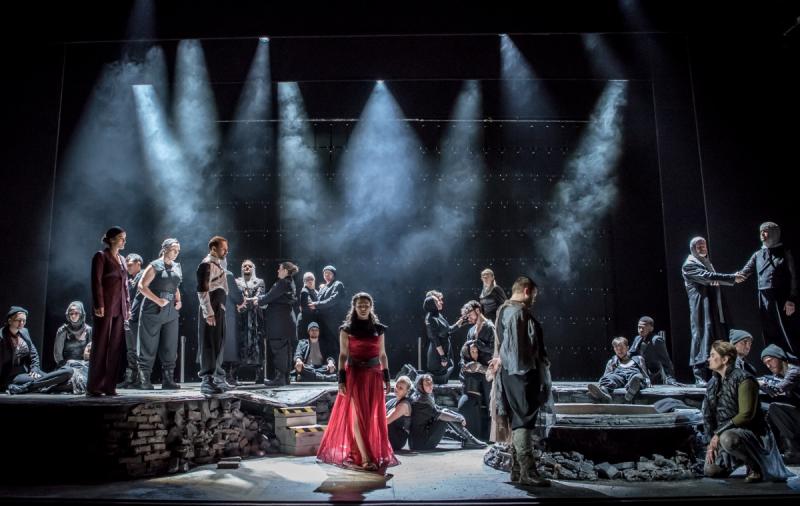
Buxton International Festival’s opera scene is clearly back on track for 2022, and its most substantial production a taut and tension-filled presentation of Rossini’s La Donna del Lago.
Jacopo Spirei’s production, with design by Madeleine Boyd, has just one basic set: it changes from Act One to Act Two by removing two evocative visual elements (a hearth and a panel of generally rustic appearance) and replacing them with geometrical and electrically dazzling shapes, and it has a binary contrast of costumes – ragged rebel Highlanders and sophisticated, techno-style royal loyalists.
So, from the Romantic lake, woods and mountain fastnesses of the original, the story is re-interpreted as a clash of cultures: poor and powerless versus superior and entitled.
That’s a clever way of seeing Walter Scott’s story (in the poem, “The Lady of the Lake”) and bringing it into relationship with today’s world. The production does not shirk, either, from highlighting the position of Elena, the heroine, as a woman on her own against a lewd, male-dominated society, with not only a domineering father but also two would-be lovers whose high Cs (and beyond) in the score betray pure testosterone-fuelled competitiveness, in contrast to the true love she finds from the travesti role of Malcom, the mezzo of the cast (Catherine Carby pictured below with Máire Flavin). 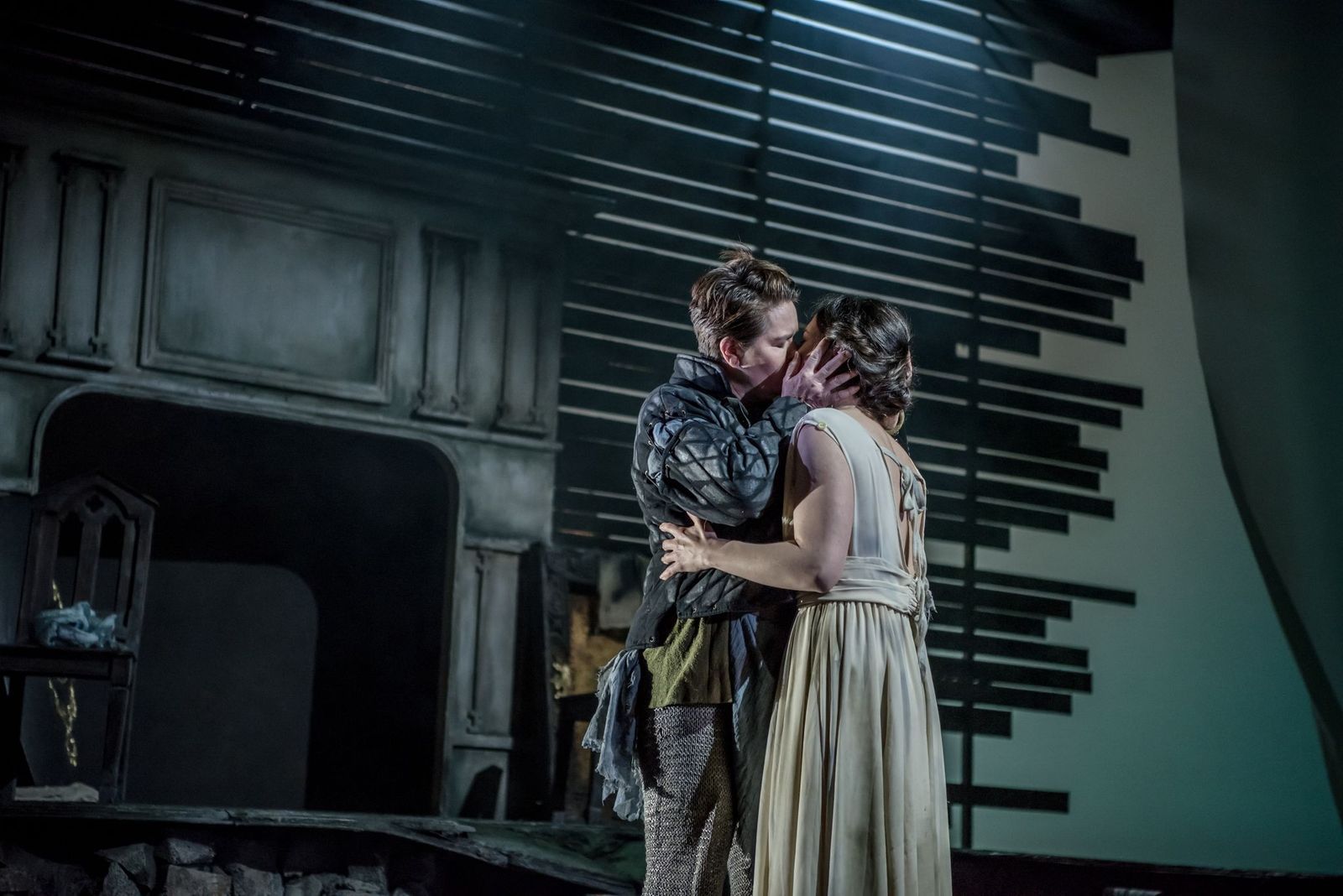 The opera may be an early example of the clichés of Romanticism in its musical language (horn calls, tremolando strings, harp accompaniment for bardic utterances), but Spirei and Boyd’s approach brings its own resonances for today. And given that there was little prospect of representing a real loch on Buxton Opera House’s compact stage, the adjustment is well conceived. Elena’s invitation to “Scendi nel piccol legno”, accompanied by handing over a tiny model of a little boat instead of offering a seat in a real one, may have been a bit of a bump in narrative consistency, but the rest worked very well.
The opera may be an early example of the clichés of Romanticism in its musical language (horn calls, tremolando strings, harp accompaniment for bardic utterances), but Spirei and Boyd’s approach brings its own resonances for today. And given that there was little prospect of representing a real loch on Buxton Opera House’s compact stage, the adjustment is well conceived. Elena’s invitation to “Scendi nel piccol legno”, accompanied by handing over a tiny model of a little boat instead of offering a seat in a real one, may have been a bit of a bump in narrative consistency, but the rest worked very well.
The story is of a time of rebellion against James V of Scotland, in which his former tutor Duglas is now caught up: Elena has been promised to rebel leader Rodrigo, but in the early scenes the noble James, in disguise as “Uberto”, meets and takes a fancy to her. Malcom joins the rebellion for love of Elena, and the chorus of Highlanders have much warlike zeal to express.
It all ends badly for them, however, and the story concludes with Elena desperately seeking to save both herself and her father, and James torn between mercy and justice. Typical opera libretto nonsense in many ways, but with its help Rossini gets some hugely dramatic moments out of the formulaic ingredients of opera seria, and a great virtue of this interpretation on opening night was the way it was driven tirelessly on by conductor Adrian Kelly, the BIF artistic director. (He shares the conducting with Giulio Cilona).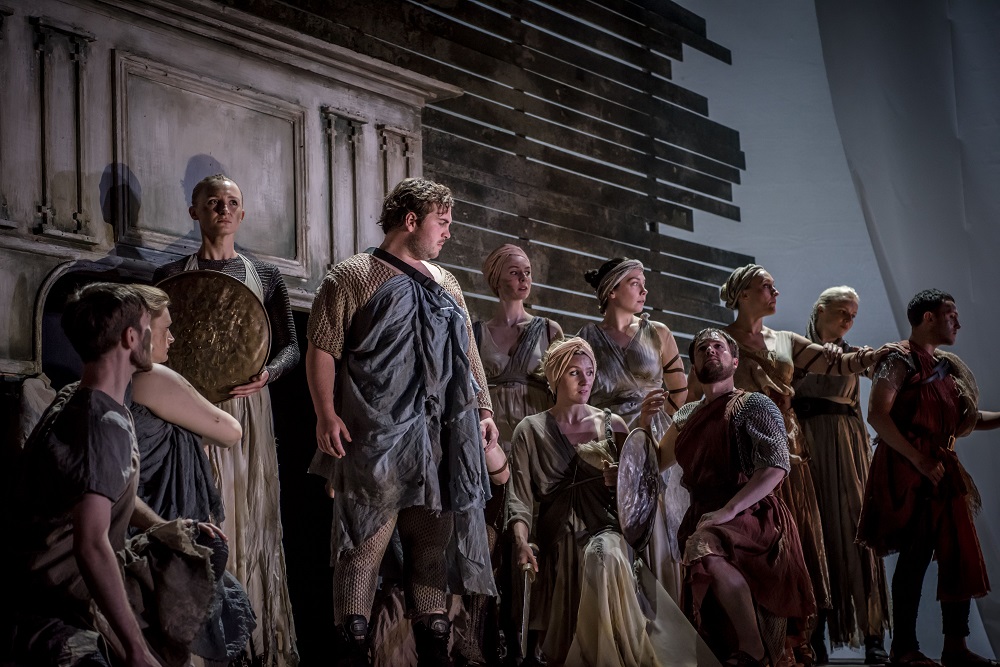 The casting for a piece that makes big demands on its principals, in mastery of coloratura technique, range and stamina, has to be classy, and that’s what Buxton has for its flagship opera this year. The two tenors are Nico Darmanin (“Uberto”/James V) and John Irvin (Rodrigo), both with ringing top notes and superb breath control, and Catherine Carby (Malcom) can match and even outdo them for sheer projection.
The casting for a piece that makes big demands on its principals, in mastery of coloratura technique, range and stamina, has to be classy, and that’s what Buxton has for its flagship opera this year. The two tenors are Nico Darmanin (“Uberto”/James V) and John Irvin (Rodrigo), both with ringing top notes and superb breath control, and Catherine Carby (Malcom) can match and even outdo them for sheer projection.
The opera makes Elena a winsome heroine from the start, with an opening to the duet “Le mie barbare vicende” that could be out of the first act of Barbieri or Cenerentola, and ends with a magnificent rondó finale, “Tanti affetti” that must be a triumphant display and bring the house down. For that Máire Flavin is the worthy choice, and no surprise either.
David Ireland contributes stirring stuff as Duglas, and Fiona Finsbury is excellent as Albina. Best of all, the Buxton Chorus (pictured above) is effectively 24-strong (including two smaller named roles of the cast) and delivers a thrilling sound. Among many highlights, the Act One finale (with blood-brotherhood smearing of paint on hands and faces all round – just like in Opera North’s Parsifal!) was one of the best. 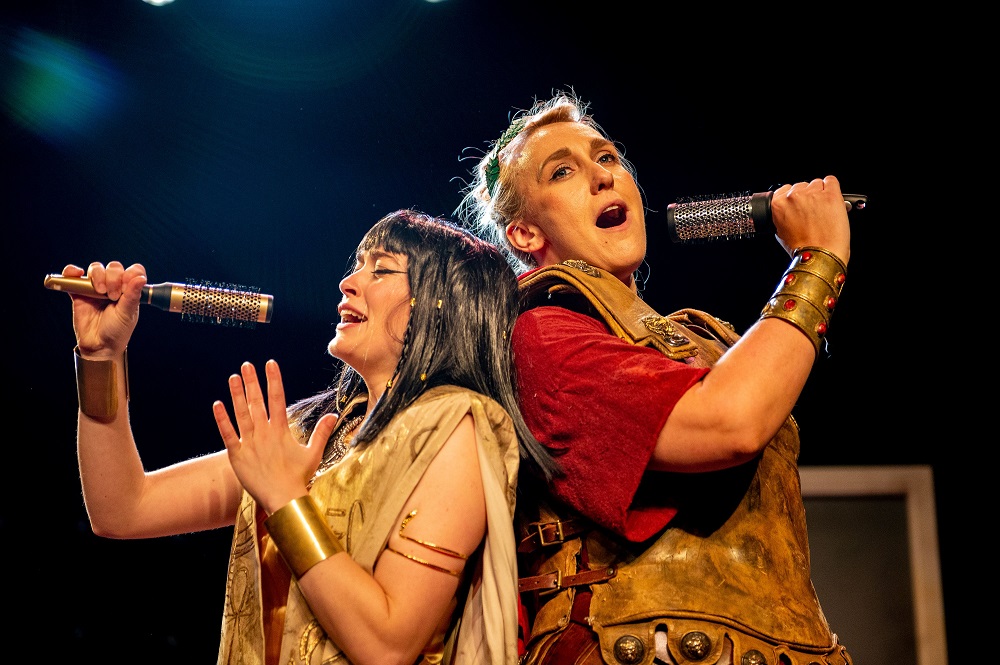 The Northern Chamber Orchestra, led by Nicholas Ward, was with Kelly every beat of the way, and skilfully controlled by him to ensure that above all, the singing counted most. This year the BIF has put considerable resources into presenting Laurents, Sondheim and Styne’s musical, Gypsy, as a joint production with Buxton Opera House, directed by its Sondheim-loving boss, Paul Kerryson, but the only other fully festival-produced opera on offer is Hasse’s Antonio e Cleopatra, a two-act baroque serenata for just two singers. It’s presented in the small Pavilion Theatre and showcases the talents of mezzo Thalie Knights and soprano Ellie Neate in the respective roles (pictured above). The staging (Evangeline Cullingworth, director; Grace Venning, set and costume designer) is rudimentary, bringing the protagonists into the present day as an apparently on-their-beam-ends young couple with a suitcase of random possessions over which to bemoan their fate, but the singing is highly accomplished.
The Northern Chamber Orchestra, led by Nicholas Ward, was with Kelly every beat of the way, and skilfully controlled by him to ensure that above all, the singing counted most. This year the BIF has put considerable resources into presenting Laurents, Sondheim and Styne’s musical, Gypsy, as a joint production with Buxton Opera House, directed by its Sondheim-loving boss, Paul Kerryson, but the only other fully festival-produced opera on offer is Hasse’s Antonio e Cleopatra, a two-act baroque serenata for just two singers. It’s presented in the small Pavilion Theatre and showcases the talents of mezzo Thalie Knights and soprano Ellie Neate in the respective roles (pictured above). The staging (Evangeline Cullingworth, director; Grace Venning, set and costume designer) is rudimentary, bringing the protagonists into the present day as an apparently on-their-beam-ends young couple with a suitcase of random possessions over which to bemoan their fate, but the singing is highly accomplished.
The festival has three other operas in its schedule: one is Waterperry Opera Festival’s Mansfield Park (Alasdair Middleton and Jonathan Dove’s chamber opera, after Jane Austen); another a single night visit from Violet, by Tom Coult (Music Theatre Wales and Britten Pears Arts’ co-production); and the third a piece called Viva la Diva, a Salzburger Landestheater production created in association with BIF, which reimagines a Donizetti comedy (originally Le Convenienze ed Inconvenienze Teatrali).
Mansfield Park is a beautiful piece and was beautifully done by the Waterperry singers, but St John’s Church, where sightlines and acoustics meant that most of the audience could not see most of the cast or hear most of the words most of the time, was not the right venue.
V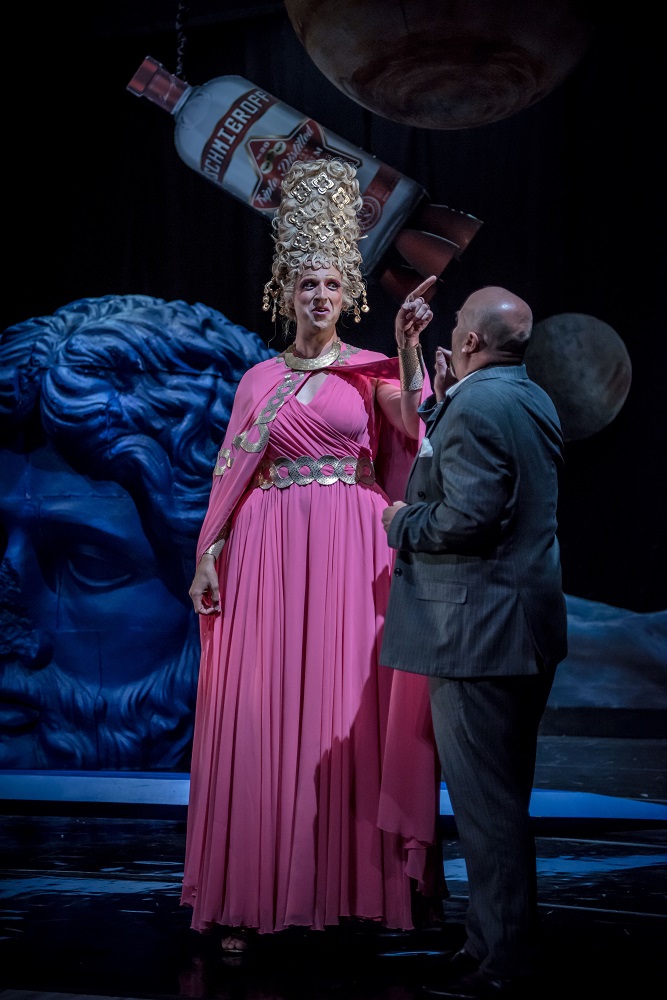 iva la Diva, the main comic offering at Buxton, is about a small opera company, its bosses and performers, putting on a show against all the odds, financial and individual, that beset it. Its Salzburg incarnation has been thoroughly adapted by Kit Hesketh-Harvey, placing it in the High Peak (surprise, surprise) and fitting new words around Donizetti’s music.
iva la Diva, the main comic offering at Buxton, is about a small opera company, its bosses and performers, putting on a show against all the odds, financial and individual, that beset it. Its Salzburg incarnation has been thoroughly adapted by Kit Hesketh-Harvey, placing it in the High Peak (surprise, surprise) and fitting new words around Donizetti’s music.
It's good to see that Buxton is capable of laughing at its (imagined) self, and the cast are quite capable of sending themselves up as well as singing some of their material straight and very well. We begin in the audition process, progress through rehearsals constantly wrecked by petty vanities and rivalries, and after the interval see a supposed “performance” that becomes The Opera That Goes Wrong. It’s all harmless fun, but not perhaps as slick and smooth as it might have been. George Humphreys (pictured above with Quentin Hayes), in drag as a very deep-voiced mezzo who towers above her tiny Italian tenor (Joseph Doody) more or less steals the show, but there are excellent performances also from Richard Burkhard, Olivia Carrell, Jenny Stafford, Lauren Young, Quentin Hayes and Raimundas Juzuitis.
- Remaining performances: La Donna del Lago 15, 17 and 22 July; Gypsy 16, 20 and 24 July; Antonio e Cleopatra 16, 20 and 22 July; Mansfield Park 18 and 21 July; Violet 18 July; Viva la Diva 19, 21 and 23 July
- More opera reviews on theartsdesk
rating
Explore topics
Share this article
Add comment
The future of Arts Journalism
You can stop theartsdesk.com closing!
We urgently need financing to survive. Our fundraising drive has thus far raised £49,000 but we need to reach £100,000 or we will be forced to close. Please contribute here: https://gofund.me/c3f6033d
And if you can forward this information to anyone who might assist, we’d be grateful.

Subscribe to theartsdesk.com
Thank you for continuing to read our work on theartsdesk.com. For unlimited access to every article in its entirety, including our archive of more than 15,000 pieces, we're asking for £5 per month or £40 per year. We feel it's a very good deal, and hope you do too.
To take a subscription now simply click here.
And if you're looking for that extra gift for a friend or family member, why not treat them to a theartsdesk.com gift subscription?
more Opera
 La bohème, Opera North review - still young at 32
Love and separation, ecstasy and heartbreak, in masterfully updated Puccini
La bohème, Opera North review - still young at 32
Love and separation, ecstasy and heartbreak, in masterfully updated Puccini
 Albert Herring, English National Opera review - a great comedy with depths fully realised
Britten’s delight was never made for the Coliseum, but it works on its first outing there
Albert Herring, English National Opera review - a great comedy with depths fully realised
Britten’s delight was never made for the Coliseum, but it works on its first outing there
 Carmen, English National Opera review - not quite dangerous
Hopes for Niamh O’Sullivan only partly fulfilled, though much good singing throughout
Carmen, English National Opera review - not quite dangerous
Hopes for Niamh O’Sullivan only partly fulfilled, though much good singing throughout
 Giustino, Linbury Theatre review - a stylish account of a slight opera
Gods, mortals and monsters do battle in Handel's charming drama
Giustino, Linbury Theatre review - a stylish account of a slight opera
Gods, mortals and monsters do battle in Handel's charming drama
 Susanna, Opera North review - hybrid staging of a Handel oratorio
Dance and signing complement outstanding singing in a story of virtue rewarded
Susanna, Opera North review - hybrid staging of a Handel oratorio
Dance and signing complement outstanding singing in a story of virtue rewarded
 Ariodante, Opéra Garnier, Paris review - a blast of Baroque beauty
A near-perfect night at the opera
Ariodante, Opéra Garnier, Paris review - a blast of Baroque beauty
A near-perfect night at the opera
 Cinderella/La Cenerentola, English National Opera review - the truth behind the tinsel
Appealing performances cut through hyperactive stagecraft
Cinderella/La Cenerentola, English National Opera review - the truth behind the tinsel
Appealing performances cut through hyperactive stagecraft
 Tosca, Royal Opera review - Ailyn Pérez steps in as the most vivid of divas
Jakub Hrůša’s multicoloured Puccini last night found a soprano to match
Tosca, Royal Opera review - Ailyn Pérez steps in as the most vivid of divas
Jakub Hrůša’s multicoloured Puccini last night found a soprano to match
 Tosca, Welsh National Opera review - a great company reduced to brilliance
The old warhorse made special by the basics
Tosca, Welsh National Opera review - a great company reduced to brilliance
The old warhorse made special by the basics
 BBC Proms: The Marriage of Figaro, Glyndebourne Festival review - merriment and menace
Strong Proms transfer for a robust and affecting show
BBC Proms: The Marriage of Figaro, Glyndebourne Festival review - merriment and menace
Strong Proms transfer for a robust and affecting show
 BBC Proms: Suor Angelica, LSO, Pappano review - earthly passion, heavenly grief
A Sister to remember blesses Puccini's convent tragedy
BBC Proms: Suor Angelica, LSO, Pappano review - earthly passion, heavenly grief
A Sister to remember blesses Puccini's convent tragedy
 Orpheus and Eurydice, Opera Queensland/SCO, Edinburgh International Festival 2025 review - dazzling, but distracting
Eye-popping acrobatics don’t always assist in Gluck’s quest for operatic truth
Orpheus and Eurydice, Opera Queensland/SCO, Edinburgh International Festival 2025 review - dazzling, but distracting
Eye-popping acrobatics don’t always assist in Gluck’s quest for operatic truth

Comments
I agree with the above review